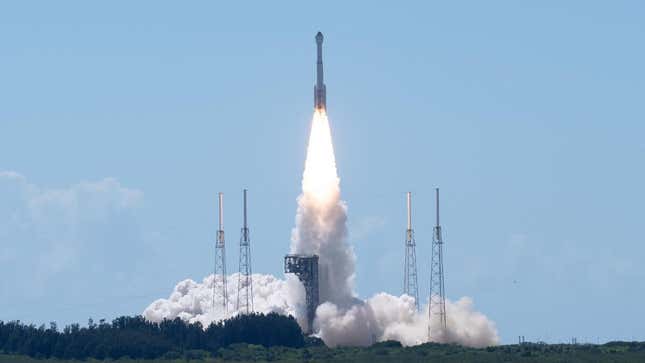
Boeing’s Starliner spacecraft developed more helium leaks on its way to the International Space Station (ISS) with a NASA crew on board.
Starliner teams identified two new leaks on the spacecraft after it had launched on Wednesday, in addition to a helium leak that was detected prior to liftoff, NASA revealed on X. “Two of the affected helium valves have been closed and the spacecraft remains stable,” the space agency wrote.
The Starliner Crewed Flight Test blasted off on June 5 from Cape Canaveral Space Force Station in Florida. The crew capsule launched atop United Launch Alliance’s Atlas V rocket, carrying NASA astronauts Butch Wilmore and Suni Williams. This is the first time Starliner has had a crew on board; the test flight suffered from numerous delays and issues leading up to the launch.
The company was originally targeting May 6 for the liftoff of Starliner but a last minute anomaly with one of the Atlas V rocket pressure valves delayed the crewed test flight to May 17. Just days before the launch, however, Starliner teams detected a small helium leak in the spacecraft’s service module, prompting them to push the launch to May 21 before it was delayed indefinitely.
The spacecraft consists of a reusable crew capsule and an expendable service module. Helium is used in the spacecraft’s thruster systems to allow the thrusters to fire without being combustible or toxic.
Last week, Boeing and NASA announced that they had decided to proceed with flying the crew on the leaky Starliner spacecraft without resolving the issue, arguing that it poses no risk to the safety of the astronauts. At the time, NASA seemed confident in its commercial partner’s vehicle despite the leaky helium. “We can handle this particular leak if that leak rate were to grow even up to 100 times,” Steve Stich, manager of NASA’s Commercial Crew Program, said during a news conference at the time.
Starliner is scheduled to dock with the ISS on Thursday at 12:15 p.m. ET, dropping off the crew at the space station. The capsule is meant to stay docked in low Earth orbit for about a week before transporting the crew back to Earth. It’s not clear whether the additional leaks would prevent NASA from relying on Starliner to transport its crew a second time around.
For more spaceflight in your life, follow us on X and bookmark Gizmodo’s dedicated Spaceflight page.




















+ There are no comments
Add yours